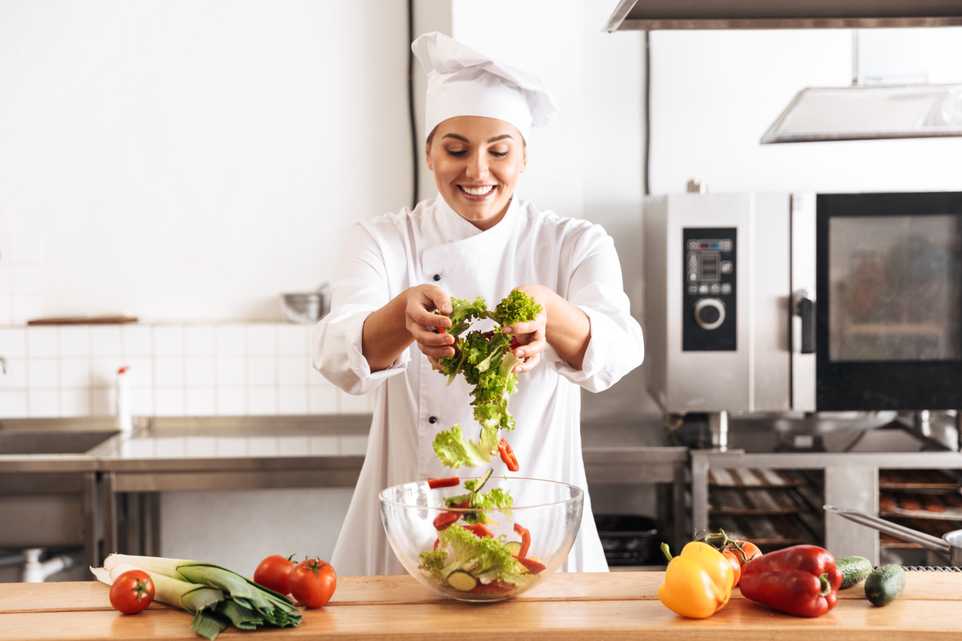
Chefs work in various settings to prepare, cook and serve food.
Chefs may work in restaurants, pubs, hotels, cruise ships, the military, or contract catering. Responsibilities and job titles may vary depending on your role, the kind of food you make, and the nature of your workplace.
Because of the job’s time and pressure requirements, you will need personal and professional devotion to learn, develop, and accomplish.
Responsibilities
Throughout your apprenticeship, you may help:
- prepare attractive menus to nutritional standards
- control and order stock and inspect it on delivery
- prepare food for cooking
- cook and present food creatively
- work under pressure so food is served on time
- keep to hygiene, health and safety and licensing rules.
Salary
- Typical starting salaries for commis chefs are between £12,000 and £16,000.
- More experienced chefs, such as sous chefs, earn between £20,000 and £30,000.
- Head chefs can expect higher salaries of £25,000 to £55,000+.
Working hours
Hours may vary greatly depending on your employment and the environment in which you work. For example, you may be required to work in the evenings, on weekends, or public holidays, depending on the nature of the organisation.
Full-time work is common in the industry. Some chefs work a standard 40-hour week.
Others follow the working time directive, meaning you would be required to work a maximum of 48 hours weekly. If you opt-out of this rule, you may choose to work more. On average, chefs work 48 to 60 hours each week.
Working environment
You could work at a restaurant, in an NHS or private hospital, at a school, at a college or on a cruise ship.
Your working environment may be hot, physically demanding and humid.
You may need to wear a uniform.
Qualifications
Qualifications you can achieve as an apprentice chef include:
Entry requirements
You’ll usually need:
- some GCSEs, usually including English and maths, or equivalent, for an intermediate apprenticeship
- 5 GCSEs at grades 9 to 4 (A* to C), or equivalent, including English and maths, for an advanced apprenticeship.
Skills
On a chef apprenticeship, you’ll learn:
- to be thorough and pay attention to detail
- knowledge of food production methods
- the ability to accept criticism and work well under pressure
- leadership skills
- the ability to work well with others
- knowledge of manufacturing production and processes
- maths knowledge
- the ability to work well with your hands
- to be able to use a computer and the main software packages competently.
Employers
Job opportunities can be found in:
- chain restaurants
- Michelin-starred and AA Rosette-awarded restaurants
- pubs and gastropubs
- educational settings (schools, colleges, universities)
- the NHS
- the armed forces
- contract catering
- cruise ships
- hotel or bar restaurants.
Professional development
Training possibilities vary depending on where you work. A big chain restaurant or contract catering business will give structured training. Independent pubs and restaurants are more likely to provide on-the-job training informally.
As a trainee chef, you will often get expertise in a variety of departments in the kitchen. Someone will assist you. This is generally the chef de partie or a similar role at a restaurant.
Key professional organisations offer industry news, publications, and training opportunities. They also provide information about available external courses and events.
The Institute of Hospitality website is a gold mine of information on certifications, training, and career growth.
Career prospects
Because of the range of cuisines and locations in the business, chefs often learn by working in numerous kitchens. As a result, you may leave your current work searching for a new challenge in the same kitchen or a similar environment.
Depending on the location of impending opportunities and your goals, you may need to travel or relocate to gain the opportunity you want.
With more education, such as an undergraduate or Masters degree, you might become a nutritionist or dietitian. Another option is to work as a food technology/cookery teacher or assessor in a college or training provider.
As an experienced chef with extensive culinary knowledge, leadership, and fiscal skills, you may become a head chef or executive chef, but this takes time and devotion. You might work as a private chef for weddings, festivities, or events if you have adequate experience and renown.
